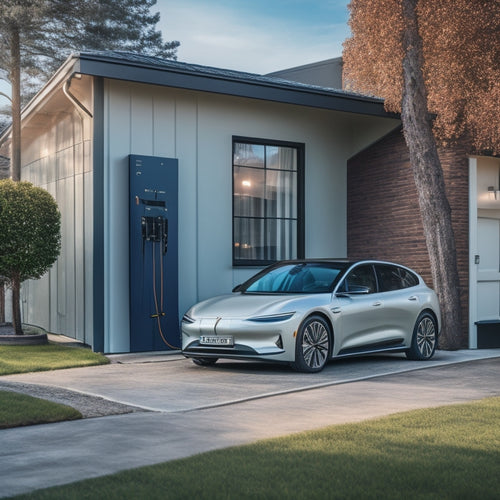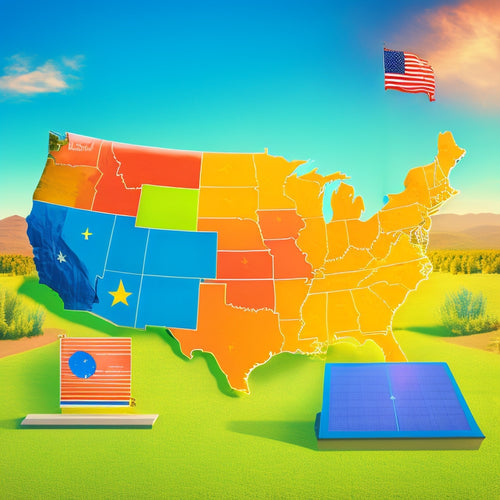
What to Know Before Installing RV Solar Panels
Share
To wrap up the installation of RV solar panels, you'll want to calculate your daily energy usage, identify appliances to be powered, and consider your battery bank and inverter capacity. Assess your RV's roof size and available space, taking into account physical constraints like roof obstructions. Choose durable, high-IP65-rated panels that integrate well with your existing electrical system. Don't forget to prioritize a compatible charge controller and monitoring system. Finally, set a realistic budget and find a certified, insured installer. By doing your homework, you'll be well on your way to harnessing the sun's energy - and there's more to explore on this journey to a solar-powered adventure.
Key Takeaways
• Determine your daily energy needs by calculating your daily energy usage in watt-hours to ensure you have enough power to support your off-grid lifestyle.
• Consider the size and type of solar panels, charge controller, and inverter to ensure compatibility and optimal energy output for your RV's electrical system.
• Assess your RV's roof size and available space to determine the maximum solar panel capacity, while accounting for physical constraints like roof obstructions.
• Choose durable solar panels with a high IP65 rating, and ensure seamless integration with your existing electrical system to minimize the risk of system failures.
• Plan your budget carefully, considering component quality, installation complexity, and certifications, and select a qualified installer with NABCEP certification and insurance coverage.
Understanding Solar Panel Requirements
To guarantee a successful RV solar panel installation, you need to determine your energy requirements. This involves calculating your daily energy usage in watt-hours (Wh) and identifying the appliances and devices that will be powered by the solar system. This step is important in selecting the right solar panels for your RV. You'll want to take into account factors such as the size of your battery bank, the type of charge controller, and the capacity of your inverter.
When choosing solar panels, you should prioritize panel durability. Look for panels with a high IP65 rating, which indicates resistance to dust and water. A sturdy panel will withstand the harsh outdoor environment and ensure a longer lifespan.
Additionally, consider system integration when selecting your solar panels. Make sure that the panels are compatible with your existing electrical system and that the installation process is seamless. A well-integrated system will maximize energy output and minimize the risk of system failures.
Assessing Your RV's Energy Needs
As you prepare to install RV solar panels, you need to assess your RV's energy needs to guarantee you're generating enough power to meet your daily requirements.
To do this, you'll need to calculate your daily energy consumption, determine the power requirements of each appliance, and consider your energy storage capacity.
Daily Energy Consumption
You'll need to calculate your RV's daily energy consumption to determine the right size of your solar panel system. This is an essential step in ensuring you have a reliable and efficient energy supply on the road.
To do this, you'll need to understand your Energy Habits and create a Power Diary to track your daily energy usage.
Here are some key areas to focus on:
-
Lighting: How many lights do you use, and for how long each day?
-
Appliances: What appliances do you use regularly, and how often?
-
Electronics: How many devices do you charge daily, and what're their power requirements?
- Fridge and Freezer: How often do you open the fridge and freezer doors, and what's your typical usage pattern?
Appliance Power Requirements
Daily, your RV's appliances consume a substantial amount of power, so accurately determining their power requirements is crucial to sizing your solar panel system correctly.
To assess your RV's energy needs, make a list of all the appliances you plan to power, including lights, refrigerators, laptops, and TVs. Note the wattage of each appliance, as well as how many hours a day you'll use them. This will give you a clear picture of your total daily energy consumption.
For example, if you have a 100W refrigerator that runs 24/7, that's 2.4 kWh per day. Add up the energy requirements of all your appliances to get your total daily energy needs. This calculation will help you determine the size of your solar panel system and guarantee you have enough power to support your off-grid lifestyle.
By upgrading your RV with a well-designed solar panel system, you'll be able to enjoy the freedom of off-grid travel without worrying about running out of power.
With a clear understanding of your energy needs, you'll be well on your way to embracing the adventures of off-grid living.
Energy Storage Capacity
Determining the total ampere-hours (Ah) required to support your appliances is essential in sizing your RV's energy storage capacity to meet your daily energy needs. You need to calculate how much energy your appliances consume to make sure your batteries can provide the necessary power.
To assess your RV's energy storage capacity, consider the following:
-
Calculate your daily energy consumption: Add up the Ah required by each appliance, taking into account their usage patterns and duration.
-
Choose the right battery type: Opt for Deep Cycle batteries, designed to provide a steady flow of energy over a longer period, ensuring your appliances remain powered.
-
Consider battery durability: Assess the battery's lifespan and its ability to withstand deep discharging and recharging, ensuring your energy storage capacity remains reliable.
- Monitor and adjust: Continuously monitor your energy consumption and adjust your storage capacity accordingly to prevent battery drain and extend their lifespan.
Choosing the Right Solar Panel
When choosing the right solar panel for your RV, you'll need to take into account the panel's efficiency and type.
You'll want to assess the panel's efficiency by looking at its wattage output per square foot, as well as its temperature coefficient to make sure it can handle high temperatures.
Assessing Panel Efficiency
Your RV's energy needs dictate the type of solar panel you require, so it's important to evaluate the efficiency of different panels to make sure you're getting the best bang for your buck. Evaluating panel efficiency is vital to guarantee you're getting the most power out of your solar setup.
Here are key factors to keep in mind when examining panel efficiency:
-
Panel Temperature: High temperatures can reduce panel efficiency. Look for panels with high temperature coefficients for peak performance.
-
Angle Optimization: The angle at which your panels are installed affects energy output. Ensure your panels are set up at the ideal angle for your RV's roof.
-
Efficiency Rating: A higher efficiency rating translates to more power per hour of sunlight. Look for panels with high efficiency ratings (e.g., 20% or higher).
- Warranty and Durability: A longer warranty and durable construction ensure your panels will perform well over time.
Comparing Panel Types
With numerous solar panel options available, you'll need to compare different types to choose the right one that meets your RV's energy requirements and fits your budget. When selecting a solar panel, take into account the panel's importance, as it will be exposed to various weather conditions on the road. Look for panels with a durable anodized aluminum frame and tempered glass to guarantee maximum protection.
Another vital factor to take into account is the cell technology used in the panel. Monocrystalline cells are more efficient but expensive, while polycrystalline cells are more affordable but less efficient. Thin-film cells are another option, offering a balance between efficiency and cost. Consider your energy needs and budget to decide which cell technology is best for you.
When comparing panel types, also take into consideration the warranty and certifications offered by the manufacturer. A reputable manufacturer will provide a detailed warranty and certifications from organizations like UL (Underwriters Laboratories) or IEC (International Electrotechnical Commission).
Selecting the Ideal Battery Type
You'll need to take into account the unique demands of your RV's electrical system when choosing a battery type that can efficiently store the energy generated by your solar panels. As you select the ideal battery type, consider the following key factors:
-
Deep Cycle capabilities: Look for batteries specifically designed for deep cycle use, as they can handle the repeated charging and discharging that comes with off-grid energy storage.
-
Battery Maintenance: Consider batteries with low maintenance requirements, such as sealed or maintenance-free options, to minimize upkeep and guarantee reliable performance.
-
Capacity and Reserve: Choose a battery with sufficient capacity to meet your energy needs, and consider a battery with a high reserve capacity to make sure you have power when you need it.
- Compatibility and Integration: Make certain the battery type is compatible with your solar panel system and other RV electrical components, and consider integrated solutions that simplify installation and monitoring.
Considering Roof Size and Space
Having selected the ideal battery type, now it's time to evaluate your RV's roof size and available space to determine the maximum number of solar panels that can be installed.
You'll need to take into account the physical constraints of your RV's roof, considering any roof obstructions such as vents, skylights, and antennas. These obstructions will impact the amount of usable space available for solar panels.
To optimize space, you'll want to measure your RV's roof carefully, taking note of any obstructions and their locations. You can then use this information to determine the maximum size and number of solar panels that can fit on your roof.
Space optimization is key, as you want to maximize your energy output while minimizing the footprint of your solar array.
When evaluating your roof's available space, be sure to take into account the size and shape of individual solar panels, as well as any necessary spacing between them.
Importance of Charge Controllers
One essential component of your RV's solar power system is the charge controller, which regulates the flow of energy from your solar panels to your batteries. This crucial device safeguards that your batteries are charged safely and efficiently, preventing damage from overcharging or undercharging. A good charge controller will also protect your batteries from overheating, which can reduce their lifespan.
Here are some key functions a charge controller should perform:
-
Voltage Regulation: The charge controller guarantees that the voltage from the solar panels matches the voltage required by your batteries, preventing damage from overvoltage or undervoltage.
-
Overheating Prevention: The controller monitors the temperature of your batteries and adjusts the charging current to prevent overheating, which can reduce battery lifespan.
-
Maximum Power Point Tracking (MPPT): The controller optimizes energy harvesting from your solar panels, ensuring you get the most power from your system.
- Low-Voltage Disconnect (LVD): The controller disconnects the load from the batteries when the voltage drops too low, preventing deep discharge and damage to your batteries.
Monitoring and Maintaining Performance
After confirming that your charge controller is regulating energy flow safely and efficiently, it's now important to regularly monitor your RV's solar power system to maintain peak performance.
You'll want to perform regular system checks to make sure everything is functioning as it should. This includes inspecting the panels, wiring, and connections for signs of wear or damage. Additionally, you should keep an eye on your system's performance metrics, such as voltage, current, and power output.
This will help you identify any potential issues before they become major problems.
To make monitoring easier, consider investing in a monitoring system that provides real-time data and performance alerts. This way, you'll be notified immediately if something goes wrong, allowing you to take corrective action quickly.
Budgeting for the Installation
You'll need to determine how much you're willing to invest in your RV's solar power system, as the cost of installation can vary widely depending on the size and complexity of the system you need. Financial planning is essential to avoid costly mistakes that can drain your wallet and leave you with a system that doesn't meet your needs.
To create a realistic budget, consider the following factors:
-
System size: The number of solar panels and batteries you need will impact the overall cost.
-
Component quality: High-efficiency panels and deep-cycle batteries come at a higher price.
-
Installation complexity: Rooftop installations are typically more expensive than ground-mounted systems.
- Certifications and warranties: Look for installers who offer certified systems with robust warranties.
Finding a Qualified Installer
With your budget in place, it's time to find an installer who can turn your solar power vision into a reality. This is an important step, as a qualified installer can make all the difference in the performance and longevity of your RV solar panel system.
When searching for an installer, make sure to do your due diligence. Start by asking for referrals from fellow RVers or online forums. Once you have a list of potential installers, it's vital to check their certification and insurance coverage. Look for installers certified by organizations like the North American Board of Certified Energy Practitioners (NABCEP). This ensures they've the necessary expertise to design and install a safe and efficient solar panel system.
Additionally, verify that the installer has adequate insurance coverage, including workers' compensation and liability insurance. This protects you and the installer in case of accidents or unforeseen events.
Frequently Asked Questions
Can I Mix Old and New Solar Panels on My Rv's Roof?
When mixing old and new solar panels on your RV's roof, you'll face potential panel compatibility issues, leading to energy loss and reduced system efficiency - it's important to verify matching voltage, current, and connector types to avoid these issues.
Do Solar Panels Work on Cloudy or Shady Days?
You'll find that solar panels still generate energy on cloudy or shady days, although with reduced energy output due to the cloud impact, which can decrease energy output by up to 50% depending on cloud density.
Will Solar Panels Affect My Rv's Resale Value?
When you install solar panels, you're likely wondering if they'll affect your RV's resale value. The good news is that they usually won't hurt, and may even boost the appraisal impact, alleviating resale concerns and making your RV more attractive to buyers.
Can I Install Solar Panels Myself or Do I Need a Pro?
If you have DIY experience with electrical systems, you might consider self-installing solar panels, but without Pro Certification, it's recommended to hire a certified pro to guarantee a safe and efficient installation.
Are Solar Panels Durable Enough for Off-Grid Adventures?
"Can you really trust solar panels to withstand the rigors of off-grid adventures? You'll be relieved to know that modern solar panels are built to withstand harsh weather conditions and rough road conditions, ensuring reliable power supply wherever you roam."
Related Posts
-

5 Essential Tips for Buying EV Charging Systems Online
When purchasing an EV charging system online, you'll want to make sure you're making an informed decision. First, det...
-

3 Best State and Local Solar Incentives USA
You can greatly reduce your energy dependence and save thousands of dollars by taking advantage of the top state and ...
-

10 Tips for Cleaner City Air With Scooters
By adopting a few simple habits, you can make a significant impact on reducing city air pollution with your scooter. ...


